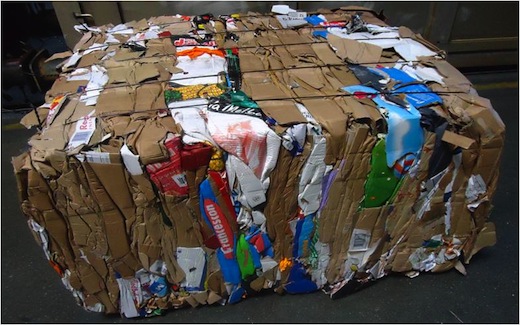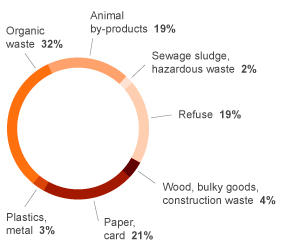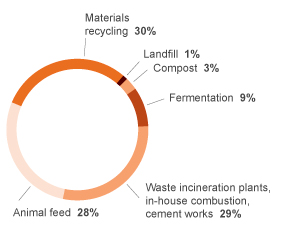
Ideas against Waste
Migros uses operating waste and customer returns in innovative ways. In 2011 it decided to take back and recycle even more used products from its customers.
Migros' principle for all operating processes is to avoid waste and close cycles of material. As such, 70% of approx. 212'000 tonnes of operating waste is used annually. The retailer vouches for a correct recycling and for a clean disposal of all hazardous waste like batteries, paints and electronic scrap. Together with customer returns, 13'500 tonnes were disposed of as special waste and waste subject to regulatory controls in 2011.
Charts on quantity of operational waste
Cooperative Retailing and Industry
1 Income Migros retail (Migros cooperatives, FMC, industrial and logistics enterprises)
Food waste used
Globally, one third of the food produced does not reach the dining table. The reasons for this are losses during storage, transport or trade as well as perishing at the consumer end. Migros aims to avoid such losses, even if consumers expect the retailer to offer fresh produce until the shops close. For this reason, Migros is continuously enhancing strategies to reduce food waste. As such, it estimates on the basis of past experience and weather models the need in the individual branches, reduces prices shortly before products' best before date or ultimately passes them on to aid organisations free of charge. Anything that nevertheless needs to be disposed of should be used as practically as possible: organic waste of the industrial enterprises is predominantly used as animal feed. Such waste from the cooperatives, including peelings and food waste from Migros restaurants, generates power, heat, biogas and biofuels in fermentation plants and is ultimately used as compost or fertiliser.
Charts on components and recycling of operational waste
Cooperative Retailing and Industry
Components of operational waste

2 Materials recycling, animal feed, fermentation, compost, without thermal utilisation (combustion)
Chart on disposal processes
Cooperative Retailing and Industry
Disposal processes operating waste

Collection system expanded
Migros provides in its shops collection points for PET drinks bottles, PE milk product bottles, batteries, electrical and electronic equipment and low-energy bulbs. Specialist retail centres stocking the relevant ranges take back many other products, such as fluorescent tubes and lights, electrical DIY, garden and hobby equipment, and paint and varnish. Migros is a leader in Swiss retailing with its return system for empty containers and used products. In 2011 it took back a total of 13'400 tonnes of waste. Migros is currently optimising the taking back of hazardous substances and chemicals, amongst other things by training its staff accordingly. For two years, Migros has also supported DC recycling as Switzerland's only retailer. Some 30 more shops were fitted with the CD deposit hole in 2011. Migros collected a total of two tonnes of used data carriers at 105 shops last year. In autumn 2011 Migros decided to roll out the CD collection system comprehensively.
Expanded plastics collection to be tested
Migros is working continuously towards expanding its return system to close materials cycles. At the Migros Lucerne Cooperative, for instance, customers have been able to dispose of other empty plastic bottles, i.e. of shower gels, shampoos or cleaning agents, together with white milk bottles since 2009. Of the various plastics types, local retailers take back PET drinks bottles such as PE milk bottles to date. The Swiss retail stakeholder group (IG DHS), to which Migros also belongs, wanted to know whether other waste materials can be added to the recycling system in Switzerland. The study completed last year showed that a mixed collection of plastic bottles would be a practical supplement to the existing separate collections. On this basis, Migros is verifying whether to roll out the collection of other plastic bottles at other Migros cooperatives too. IG DHS, however, argued against collecting drink cartons. The main reason was the unclear financing despite several meetings with drink carton manufacturers. Also, drink cartons will be increasingly switched to FSC carton and have a good life cycle assessment already today without being recycled.
Chart on customer returns
Fighting against littering
Instead of ending up in the designated waste containers, every year a significant amount of waste lands in the streets, on squares and pavements. Together with the Swiss retail stakeholder group (IG DHS) and the Clean Environment interest group (IGSU), Migros supports the authorities in numerous projects for clean public spaces. In addition to providing the collection infrastructure in shops and numerous logistics services, Migros is committed to fighting against littering, in particular with voluntary measures. As such, on the 2011 Day of Volunteering, 90 employees cleaned the Rhone bank in Geneva and filled 100 rubbish bags with drink and take-away packaging, cigarette ends and other waste. With numerous measures, Migros therefore proves that it takes its responsibility in fighting littering very seriously. However, together with the IG DHS, the retailer rejects a unilateral imposing of costs and is waiting with interest to hear the pending Federal Supreme Court decision in connection with the financing of public waste. The retailer took legal steps to protect itself against the double imposing of fees, which the city of Berne plans to levy on take-away outlets.